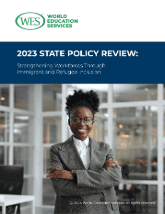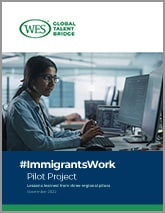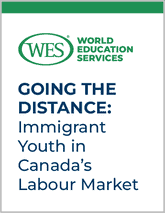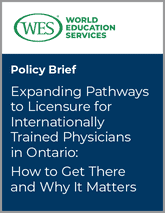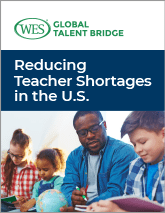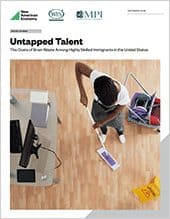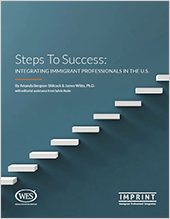Research Topics
Browse research reports and other research-based documents from the WES Research team and WES Global Talent Bridge.
2023 State Policy Review: Strengthening Workforces Through Immigrant and Refugee Inclusion
(March, 2024)This report reviews state-level policy reforms enacted in 2023 to advance more equitable educational and workforce opportunities and outlines inclusive measures that state policymakers can promote during 2024 state legislative sessions and beyond.
#ImmigrantsWork Case Study: Lessons Learned from Three Regional Pilots
(May, 2023)This paper presents key findings and lessons learned from three regional pilot projects aimed at testing the effectiveness of engaging employers in creating customized versions of practical resources designed to attract, engage, and retain immigrant talent. The paper includes feedback from the participating regions and employers in the Regional Municipality of Waterloo, the Regional Municipality of Durham, and Greater Moncton.
Going the Distance: Immigrant Youth in Canada’s Labour Market
(February, 2023)This report examines the disparity between the high levels of academic success immigrant and refugee youth achieve and the challenges they encounter when seeking to enter the workforce. It also provides several programmatic and policy recommendations to facilitate the inclusion and long-term advancement of immigrant and refugee youth.
Expanding Pathways to Licensure for Internationally Trained Physicians in Ontario: How to Get There and Why It Matters
(January, 2023)This policy brief examines the investments required and benefits to be realized by implementing three measures that can improve access to care, equity, and sustainability within Ontario’s health care workforce.
Addressing the Underutilization of Internationally Educated Health Professionals in Canada: What the Data Does and Doesn’t Tell Us
(March, 2022)This policy brief can help researchers and policymakers understand the extent of skill underutilization of IEHPs, the scope and the limitations of existing data, and where improvements can be most impactful.
Can Immigrant Professionals Help Reduce Teacher Shortages in the U.S.?
(November, 2018)This report explores the role that immigrant and refugee professionals can play in addressing these urgent shortages – and increasing the diversity of the teacher workforce – through alternative teacher certification programs that tap into these newcomers’ training, skills, and professional experience. The report looks at developing initiatives in several states and cities as well as relevant federal policies. It also offers wide-ranging recommendations for promising program and policy models, and how local, state, and national education stakeholders can work together to leverage the unique assets that immigrant professionals bring to addressing the needs of schools and students across the U.S.
Untapped Talent: The Economic Costs of Brain Waste Among Highly Skilled Immigrants in the United States
(December, 2016)The United States has long attracted some of the world’s best and brightest, drawn by the strong U.S. economy, renowned universities, and reputation for entrepreneurship and innovation. But because of language, credential-recognition, and other barriers many of these highly skilled, college-educated immigrants cannot fully contribute their academic and professional training and skills once in the U.S. As a result they work in low-skilled jobs or cannot find a job — a phenomenon known as brain waste.
World Education Services (WES), New American Economy (NAE), and Migration Policy Institute (MPI) present the key findings from the first-ever U.S. estimates of the economic costs of this skill under-utilization for immigrants, their families, and the U.S. economy.
Steps to Success: Integrating Immigrant Professionals in the United States
(September, 2015)How can communities unlock the full potential of immigrant professionals within their workforce? Which factors have influenced the economic success of foreign-educated immigrants in the U.S.? This report details the results of a groundbreaking study on the experiences of immigrant professionals, and offers recommendations for more fully utilizing their talents and training.
WES Global Talent Bridge and IMPRINT created this report from a survey of immigrant professionals in six U.S. cities, identifying the factors that correlate with their successful integration into our communities.
